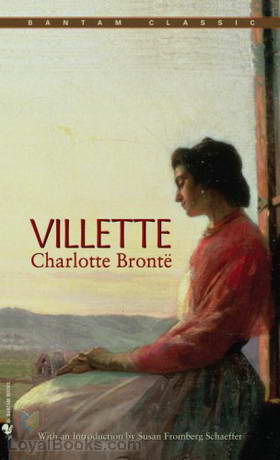
Villette was Charlotte Bronte’s last published novel. It came out in 1853, just two years before her death in 1855. It is a poignant, strangely lonely and sad work, steeped in conflict between society’s demands and personal desires.
Set in the fictional town of Villette in France, it is the story of the young and intelligent Lucy Snowe, the narrator in the book. She is described by another character in the book as having “no beauty…no attractive accomplishments…” and strangely seems to lack a personal history or living relatives. Her godmother Mrs. Bretton looks after the orphaned Lucy, who suddenly leaves the house for a reason that is not made clear to readers. She finds employment as a companion to an elderly widow, Mrs. Marchmont. When her employer dies, Lucy is left without a job or prospects. Impulsively, she decides to travel to Europe and en route, meets the young and spoiled heiress, Ginevra Fanshaw, a student of a girls’ school in Villette. Lucy then travels to Villette to work first as a nanny to the principal’s children and later as a teacher. Here she encounters two men who will play a great role in her life. The young and handsome Dr. John Bretton, her godmother’s grandson, and the arrogant, bad tempered Professor Paul Emmanuel, a fellow lodger at her boarding house who gradually begins to thaw towards Lucy. The rest of the story follows Lucy’s life in Villette.
Lucy Snowe is not a very lovable heroine. She is passive, secretive and yet she excites the reader’s interest and compassion and one is compellingly drawn into her story. Villette is also a novel with deep psychological underpinnings. Many have dubbed it even greater than Jane Eyre. It is also one of Bronte’s most autobiographical works. The story harks back to the time when Charlotte and Emily Bronte traveled to Brussels to work in a small pensionnat run by M. Constantin Heger and his wife. Charlotte is reputed to have fallen deeply and hopelessly in love with M. Heger. Paul Emmanuel is said to be based on Heger, while John Bretton is a fictional portrayal of George Murray Smith, her publisher who had once courter her.
Villette was written at a time when Bronte was deeply depressed following the deaths of three of her siblings. It was also criticized by contemporary reviewers for its depiction of a woman’s passions and desires, something which Victorian audiences were a little shocked by.
For modern day readers, Villette presents a great writer, working at the peak of her powers, overcoming personal tragedy to bring her art to the world.

Other Audiobook
Audiobook: Poetry Miscellany 02
As we get older, many of us return to youthful memories of poems once significant
Audiobook: Mother and the Child
“The mother and the child” is a lecture given by Maria Montessori in 1915. The
Audiobook: Magic of the Horse-Shoe
The study of the origin and history of popular customs and beliefs affords an insight,
Audiobook: Laramie Holds The Range
As with most of Frank Spearman’s novels (and non-fiction), “Laramie Holds the Range” is set
Audiobook: Kriloff’s Fables
Herein is a collection of 86 fables translated into English from the 201 written by
Audiobook: Adventures of an Ugly Girl
“Come, Dora! I shall never be ready, if you don’t make haste. They will be
Audiobook: The Fables of Phaedrus
The fable is a small narrative, in prose or verse, which has as its main
Audiobook: Book of the Thousand Nights and a Night (Arabian Nights) Volume 12
This is a collection of stories collected over thousands of years by various authors, translators
Audiobook: Now It Can Be Told
In this book I have written about some aspects of the war which, I believe,
Audiobook: Sally Simpkin’s Lament; or, John Jones’s Kit-Cat-Astrophe
LibriVox volunteers bring you 9 recordings of Sally Simpkin’s Lament; or, John Jones’s Kit-Cat-Astrophe by
Audiobook: Life of Henry David Thoreau
Henry David Thoreau was a fascinating man, contributing vast amounts of information on nature history,
Audiobook: Economic Consequences of the Peace
The Economic Consequences of the Peace (1919) was a best seller throughout the world, published